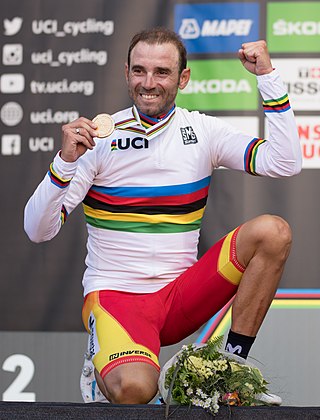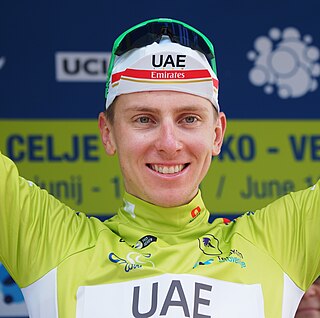| Race | Date | Winner | Second | Third | Other points [2]
(4th place onwards) | Stage points |
|---|
 Tour Down Under Tour Down Under | Jan 19 – Jan 24 |  André Greipel (GER) André Greipel (GER)
(100 pts) |  Luis León Sánchez (ESP) Luis León Sánchez (ESP)
(80 pts) |  Greg Henderson (NZL) Greg Henderson (NZL)
(70 pts) | 60, 50, 40, 30, 20, 10, 4 | 6, 4, 2, 1, 1 |
 Paris–Nice Paris–Nice | Mar 7 – Mar 14 |  Alberto Contador (ESP) Alberto Contador (ESP)
(100 pts) |  Luis León Sánchez (ESP)† Luis León Sánchez (ESP)†
(80 pts) |  Roman Kreuziger (CZE)† Roman Kreuziger (CZE)†
(70 pts) | 60, 50, 40, 30, 20, 10, 4 | 6, 4, 2, 1, 1 |
 Tirreno–Adriatico Tirreno–Adriatico | Mar 10 – Mar 16 |  Stefano Garzelli (ITA) Stefano Garzelli (ITA)
(100 pts) |  Michele Scarponi (ITA) Michele Scarponi (ITA)
(80 pts) |  Cadel Evans (AUS) Cadel Evans (AUS)
(70 pts) | 60, 50, 40, 30, 20, 10, 4 | 6, 4, 2, 1, 1 |
 Milan–San Remo Milan–San Remo | Mar 20 |  Óscar Freire (ESP) Óscar Freire (ESP)
(100 pts) |  Tom Boonen (BEL) Tom Boonen (BEL)
(80 pts) |  Alessandro Petacchi (ITA) Alessandro Petacchi (ITA)
(70 pts) | 60, 50, 40, 30, 20, 10, 4 | N/A |
 Volta a Catalunya Volta a Catalunya | Mar 22 – Mar 28 |  Joaquim Rodríguez (ESP) Joaquim Rodríguez (ESP)
(100 pts) |  Xavier Tondó (ESP) Xavier Tondó (ESP)
(80 pts) |  Rein Taaramäe (EST) Rein Taaramäe (EST)
(70 pts) | 60, 50, 40, 30, 20, 10, 4 | 6, 4, 2, 1, 1 |
 Gent–Wevelgem Gent–Wevelgem | Mar 28 |  Bernhard Eisel (AUT) Bernhard Eisel (AUT)
(80 pts) |  Sep Vanmarcke (BEL) Sep Vanmarcke (BEL)
(60 pts) |  Philippe Gilbert (BEL) Philippe Gilbert (BEL)
(50 pts) | 40, 30, 22, 14, 10, 6, 2 | N/A |
 Tour of Flanders Tour of Flanders | April 4 |  Fabian Cancellara (SUI) Fabian Cancellara (SUI)
(100 pts) |  Tom Boonen (BEL) Tom Boonen (BEL)
(80 pts) |  Philippe Gilbert (BEL) Philippe Gilbert (BEL)
(70 pts) | 60, 50, 40, 30, 20, 10, 4 | N/A |
 Tour of the Basque Country Tour of the Basque Country | Apr 5 – Apr 10 |  Chris Horner (USA) Chris Horner (USA)
(100 pts) |  Beñat Intxausti (ESP)† Beñat Intxausti (ESP)†
(80 pts) |  Joaquim Rodríguez (ESP)† Joaquim Rodríguez (ESP)†
(70 pts) | 60, 50, 40, 30, 20, 10, 4 | 6, 4, 2, 1, 1 |
 Paris–Roubaix Paris–Roubaix | Apr 11 |  Fabian Cancellara (SUI) Fabian Cancellara (SUI)
(100 pts) |  Thor Hushovd (NOR) Thor Hushovd (NOR)
(80 pts) |  Juan Antonio Flecha (ESP) Juan Antonio Flecha (ESP)
(70 pts) | 60, 50, 40, 30, 20, 10, 4 | N/A |
 Amstel Gold Race Amstel Gold Race | Apr 18 |  Philippe Gilbert (BEL) Philippe Gilbert (BEL)
(80 pts) |  Ryder Hesjedal (CAN) Ryder Hesjedal (CAN)
(60 pts) |  Enrico Gasparotto (ITA) Enrico Gasparotto (ITA)
(50 pts) | 40, 30, 22, 14, 10, 6, 2 | N/A |
 La Flèche Wallonne La Flèche Wallonne | Apr 21 |  Cadel Evans (AUS) Cadel Evans (AUS)
(80 pts) |  Joaquim Rodríguez (ESP) Joaquim Rodríguez (ESP)
(60 pts) |  Alberto Contador (ESP) Alberto Contador (ESP)
(50 pts) | 40, 30, 22, 14, 10, 6, 2 | N/A |
 Liège–Bastogne–Liège Liège–Bastogne–Liège | Apr 25 |  Alexander Vinokourov (KAZ) Alexander Vinokourov (KAZ)
(100 pts) |  Alexandr Kolobnev (RUS) Alexandr Kolobnev (RUS)
(80 pts) |  Philippe Gilbert (BEL)† Philippe Gilbert (BEL)†
(70 pts) | 60, 50, 40, 30, 20, 10, 4 | N/A |
 Tour de Romandie Tour de Romandie | Apr 27 – May 2 |  Simon Špilak (SLO)† Simon Špilak (SLO)†
(100 pts) |  Denis Menchov (RUS)† Denis Menchov (RUS)†
(80 pts) |  Michael Rogers (AUS)† Michael Rogers (AUS)†
(70 pts) | 60, 50, 40, 30, 20, 10, 4 | 6, 4, 2, 1, 1 |
 Giro d'Italia Giro d'Italia | May 8–30 |  Ivan Basso (ITA) Ivan Basso (ITA)
(170 pts) |  David Arroyo (ESP) David Arroyo (ESP)
(130 pts) |  Vincenzo Nibali (ITA) Vincenzo Nibali (ITA)
(100 pts) | 90, 80, 70, 60, 52, 44, 38, 32, 26, 22 18, 14, 10, 8, 6, 4, 2 | 16, 8, 4, 2, 1 |
 Critérium du Dauphiné Critérium du Dauphiné | Jun 6 – Jun 13 |  Janez Brajkovič (SLO) Janez Brajkovič (SLO)
(100 pts) |  Alberto Contador (ESP) Alberto Contador (ESP)
(80 pts) |  Tejay van Garderen (USA) Tejay van Garderen (USA)
(70 pts) | 60, 50, 40, 30, 20, 10, 4 | 6, 4, 2, 1, 1 |
 Tour de Suisse Tour de Suisse | Jun 12 – Jun 20 |  Fränk Schleck (LUX) Fränk Schleck (LUX)
(100 pts) |  Lance Armstrong (USA) [3] Lance Armstrong (USA) [3]
(80 pts) |  Jakob Fuglsang (DEN) Jakob Fuglsang (DEN)
(70 pts) | 60, 50, 40, 30, 20, 10, 4 | 6, 4, 2, 1, 1 |
 Tour de France Tour de France | Jul 3 – Jul 25 |  Andy Schleck (LUX)† Andy Schleck (LUX)†
(200 pts) |  Denis Menchov (RUS)† Denis Menchov (RUS)†
(150 pts) |  Samuel Sánchez (ESP)† Samuel Sánchez (ESP)†
(120 pts) | 110, 100, 90, 80, 70, 60, 50, 40, 30, 24, 20, 16, 12, 10, 8, 6, 4 | 20, 10, 6, 4, 2 |
 Clásica de San Sebastián Clásica de San Sebastián | Jul 31 |  Luis León Sánchez (ESP) Luis León Sánchez (ESP)
(80 pts) |  Alexander Vinokourov (KAZ) Alexander Vinokourov (KAZ)
(60 pts) |  Carlos Sastre (ESP) Carlos Sastre (ESP)
(50 pts) | 40, 30, 22, 14, 10, 6, 2 | N/A |
 Tour de Pologne Tour de Pologne | Aug 1 – Aug 7 |  Dan Martin (IRL) Dan Martin (IRL)
(100 pts) |  Grega Bole (SLO) Grega Bole (SLO)
(80 pts) |  Bauke Mollema (NED) Bauke Mollema (NED)
(70 pts) | 60, 50, 40, 30, 20, 10, 4 | 6, 4, 2, 1, 1 |
 Vattenfall Cyclassics Vattenfall Cyclassics | Aug 15 |  Tyler Farrar (USA) Tyler Farrar (USA)
(80 pts) |  Edvald Boasson Hagen (NOR) Edvald Boasson Hagen (NOR)
(60 pts) |  André Greipel (GER) André Greipel (GER)
(50 pts) | 40, 30, 22, 14, 10, 6, 2 | N/A |
  Eneco Tour Eneco Tour | Aug 17 – Aug 24 |  Tony Martin (GER) Tony Martin (GER)
(100 pts) |  Koos Moerenhout (NED) Koos Moerenhout (NED)
(80 pts) |  Edvald Boasson Hagen (NOR) Edvald Boasson Hagen (NOR)
(70 pts) | 60, 50, 40, 30, 20, 10, 4 | 6, 4, 2, 1, 1 |
 GP Ouest-France GP Ouest-France | Aug 22 |  Matthew Goss (AUS) Matthew Goss (AUS)
(80 pts) |  Tyler Farrar (USA) Tyler Farrar (USA)
(60 pts) |  Yoann Offredo (FRA) Yoann Offredo (FRA)
(50 pts) | 40, 30, 22, 14, 10, 6, 2 | N/A |
 Vuelta a España Vuelta a España | Aug 28 – Sep 19 |  Vincenzo Nibali (ITA) Vincenzo Nibali (ITA)
(170 pts) |  Peter Velits (SVK) Peter Velits (SVK)
(130 pts) |  Joaquim Rodríguez (ESP) Joaquim Rodríguez (ESP)
(100 pts) | 90, 80, 70, 60, 52, 44, 38, 32, 26, 22 18, 14, 10, 8, 6, 4, 2 | 16, 8, 4, 2, 1 |
 GP de Québec GP de Québec | Sept 10 |  Thomas Voeckler (FRA) Thomas Voeckler (FRA)
(80 pts) |  Edvald Boasson Hagen (NOR) Edvald Boasson Hagen (NOR)
(60 pts) |  Robert Gesink (NED) Robert Gesink (NED)
(50 pts) | 40, 30, 22, 14, 10, 6, 2 | N/A |
 GP de Montréal GP de Montréal | Sept 12 |  Robert Gesink (NED) Robert Gesink (NED)
(80 pts) |  Peter Sagan (SVK) Peter Sagan (SVK)
(60 pts) |  Ryder Hesjedal (CAN) Ryder Hesjedal (CAN)
(50 pts) | 40, 30, 22, 14, 10, 6, 2 | N/A |
 Giro di Lombardia Giro di Lombardia | Oct 16 |  Philippe Gilbert (BEL) Philippe Gilbert (BEL)
(100 pts) |  Michele Scarponi (ITA) Michele Scarponi (ITA)
(80 pts) |  Pablo Lastras (ESP) Pablo Lastras (ESP)
(70 pts) | 60, 50, 40, 30, 20, 10, 4 | N/A |









